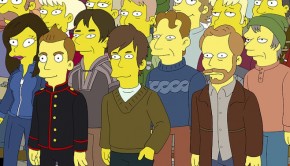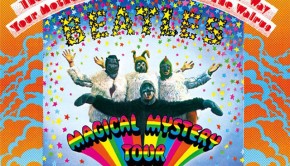 Parklife… Racing ahead of the pack
Parklife… Racing ahead of the pack
Review: Blur – Parklife (Special Edition)
Published on July 13th, 2012 | Jonny Abrams
Whereas 1993’s Modern Life is Rubbish was rather more of an artistic triumph than a commercial success, the following year’s Parklife not only hit each of those bull’s eyes but split the arrows in twain with a flurry of subsequent, unerringly accurate rounds. Basically, Blur went stratospheric in the most deserved of ways, incurring as they did so legions of ‘laddish’ followers who didn’t realise they were being lampooned. Oh Britpop, how irony wrong-footed you!
NB: This is not a review of the forthcoming remastered editions but of the original material.
That the likes of “Girls & Boys” and “Parklife” can still elicit boorish mass bellow-alongs with their smartly satirical lyrics is a perverse success that the band themselves may or may not see as an albatross; in any case, it made them perhaps the most high-profile British band of the ’90s that actually had something to say. Align this with divine, inventive pop music and you’ve got yourself one truly seminal album there, mister.
Indeed yours truly used to sit there leafing through its luxurious CD booklet playing the tracks in different running orders to experience it differently. It remains a very important album to a great many people, and whatever absurdity it was to become synonymous with should be entirely secondary to the fact that the music itself is…*gulp*…worthy of The Beatles or The Kinks in their respective pomps. Yup.
As with Pulp’s “Disco 2000”, if you are of a certain age and can’t sing along with every word of “Girls & Boys” then there must be something wrong with you. You might even opt to air-guitar along with arguably Alex James’s finest bass line (and one of the greatest ever committed to pop song) or Graham Coxon’s infectious, insistent guitar screeches, or even thump the ether to the steady disco beat. It’s a classic all ways up, always will be, and Damon Albarn’s superb lyrics are, like The Day Today, as relevant today as they were back then. And how much fun are Coxon’s backing vocals of “Girls! Boys! Boys! Girls!”? A lot of fun, that’s how much.
Many bands have wanted to be like Blur over the years and “Tracy Jacks” is a compelling example of why they couldn’t do it: they just couldn’t write songs like this. It’s sweet, silly, soulful, blissfully melodic, rousing…it’s pretty much the perfect pop song, and only one example of such on Parklife alone. “I’d love to stay here and be normal / But then it’s just so overrated” – little would Albarn have known at the time but he could almost have been writing about his future self, one of the most recognisable faces in the country. Coxon shines here with gorgeous high-pitched woo oo oos and a frankly alien guitar solo, and he proceeds to take it in a whole new direction with groovy Beatles-y guitar which in turn gets swamped by eerie atmospheric keyboards. Here are four musicians realising they can do anything they want and make it brilliant
Third track “End of a Century”: how to stop the superlatives rolling out? And how awesome an opening three tracks is that? This listener is now indeed getting “closer to thirty” and it’s still as luxuriously rousing as it was back then. “End of a century / It’s nothing special” – and, with a distinct shortage of albums to compare with this during the entire noughties, so it proved.
“Parklife” will get people bouncing forever more. If the confidence they must have had to even attempt this isn’t startling enough, the fact that they absolutely nailed it is quite exceptional. Recognisable in seconds, grinning from ear to ear, this is the immaculate convergence of pure cheek, sheer intelligence and astoundingly good fun in pop song, conceivably the first of which to refer to brewer’s droop in its lyrics (anyone know?).
Rocksucker still wants to play “Bank Holiday” every bank holiday, which has allowed it to endure more than its thrashy throwaway feel might originally have indicated. In fact it feels with hindsight like a precursor to “Chinese Bombs”, while the massive silly keyboard points to The Great Escape in the more immediate future.
“Badhead” is one of the most beautiful, wistful and weary breakup songs ever written. “I might as well just grin and bear it / ‘Cause it’s not worth the trouble of an argument” laments Albarn with a gusto in splendid contrast to his light-of-touch verse vocal, while Coxon’s impossibly warm, glowing guitar says it all in musical form too, as if his guitar is empathising with Damon. Perfect, just perfect.
We then have the daft yet oddly contemplative oom-pah instrumental “The Debt Collector”, whose brass section, flute, oboe and sax parts harmonise and flutter off again. This is a preposterous inclusion when you think about it but it’s felt right at home since day one. That this would never have even occurred to Oasis just goes without saying, and could you imagine one of today’s bands pulling this off with so much gosh darn chutzpah? Parklife is by now all kinds of genius.
Then – THEN! – you get an ever weirder song, the Alex-sung sci-fi experiment of “Far Out”. It’s so eerie, then so beguiling, creeping along on James’s nonsense-sounding-but-space-referencing lyrics, becomes quite stirring with its “quiet in the sky at night” chorus, and ends perfectly with the looped “sun” getting filtered out to sound like a sample from some 1930s radio broadcast.
Enter Stereolab chanteuse Laetitia Sadier for the utterly majestic “To the End”. Swoonsome to the nth degree, flush with the rueful drunken reflection aired previously on “Badhead”, this melds sophistication with soaring melody – spine-tingling on the chorus – in a way that could have been so easily overblown but is executed with just the right amount of subtlety to for its ornate textures to flourish. Albarn’s stunning vocal performance here was one in the eye for all those Mockney accusations that missed the point so spectacularly, and that romantic circus theme interlude? How??
“London Loves” heralds Parklife‘s even-more-urban second half with wonky, barbed, filthily catchy sort-of-digi-funk and another cracking Albarn performance, the detached quality he imbues “misery of a speeding heart” with evidence of a showman at the top of his game. This could easily have been a hit single in its own right, and even wanders into jerky Talking Heads dance-floor territory with a commanding exchange of ohs and wuh-ohs between Albarn and Coxon as the latter’s guitar freaks out entirely.
Albarn sounds grizzled and menacing in the lean, mean, whirring, grinding, chugging, foreboding “Trouble in the Message Center”, the malevolent sibilance of “Your thoughts are just pissing away” counterbalanced by Coxon’s breezy ooh la la las and playing out as one or two other Blur classics do, with a hearty round of la la las.
“Clover Over Dover” is another that would have been an obvious single choice for any normal band; it manages to sound so succinctly like a moment of quiet reflection, the narrative inhabitant of which is giving consideration to leaping off the titular cliffs. The twinkling harpsichord and deliciously chiming Coxon lead tempers this tale of Lemmings-sympathising, our protagonist just throwing out there “I’d like to roll in the clover / With you over and over / On the White Cliffs of Dover / And then I’d let you push me over”. Oh so jolly until that last bit…
Next up is Bill Barrett’s simple dream, namely “Magic America”, the second of a trilogy-of-sorts that started with “Miss America” on Modern Life… and continued with “Look Inside America” on 1997’s eponymous album. “Bought and ate ’til he could do neither anymore / Then found love on channel 44” relays Albarn over wonky, spidery odd-pop, the assumed sense of wonderment continuing unabated with “59 cents gets you a good square meal / From the people who care how you feel” and a splendidly wrong-but-right-sounding round of na na nas. There’s a descending keyboard line akin to that of “To the End” but it takes on a different feel in this goofier setting.
Both “Magic America” and the ensuing “Jubilee” point towards the slightly unhinged pop of the following year’s The Great Escape. The totally rockin’ tale of a slothenly teenager, “Jubilee” is not an obvious stand-out on Parklife and yet it would likely have been the obvious choice of single for 99.9% of bands. Tremendously entertaining computer game sound FX and still-pointed lyrics about watching “24 hours of rubbish” all add to the cartoonish majesty of the thing, paving the way for “This is a Low” to steal the show with an epic broadcast over and across the sea. If Rocksucker had its way then we’d make “This is a Low” the national anthem in an instant; after all, wouldn’t it make a nice change to sing about the Queen going round the bend and jumping off Land’s End instead?
“This is a LOOOOOOOOOWWWW! / But it won’t huuuuurrrrt yoooooouuuuu…” – need we say any more?
“Lot 105” is such a silly yet strangely ideal note to go out on, a good-natured skank on a seaside organ jingle that explodes into daft punky la la la-ing and climaxes on a hearty group sing-along of “Eighteen times a week, love”. Thus endeth one of the greatest albums there ever was.
The extras disc kicks off with the driving, sun-kissed fare of “Magpie”, breezily B-sidey but in a good way, like a band sounding magnificent without even trying all that much. Pleasingly it ends in cacophony. “Anniversary Waltz” sounds like it must have originated from the same sessions as “The Debt Collector”; it’s the same basic make-up and splendidly diverting with it, again ending pleasingly, this time with farmyard animal noises.
“People in Europe” has that “Magic America”/”Jubilee” daftness about it, Albarn’s lamentable pronunciation of “dos cervezas por favor” presumably intentional; it’s disposable silliness really, an undeveloped “Girls & Boys”, but nowt to hold against ’em, and “Peter Panic” up next comes very close to being something special until it resolves its expertly unfurling chorus on an all-too-Blur F key with the bass string hammering off to E and back on “when you’re running out of sugar”. It’s a classic glam-rock maneuver but just feels shoe-horned in here, which is a shame as “Peter Panic” is otherwise excellent, even if he does have “little pissy eyes”.
Is “Girls & Boys (Pet Shop Boys 12 Inch Mix)” different to the 7 inch remix I own? If so then it’s the obligatory mid-’90s remix – seven minutes of unnecessariness, then – but the sloppy sludge-rock of “Threadneedle Street” acquires a killer fuzz riff that’s pretty darn splendid, icing the cake of its own syrupy, Madness-esque southern soul. It’s marvellous stuff, alright.
Is “Got Yer” a “Debt Collector” offshoot too? It’s fairly nightmarish and ends with someone shooting a goose, but it somehow works a treat as a sinister lead-in to the convincingly slick jazz instrumental “Beard”. What is going on here? Is that Albarn tinkling those ivories, and Dave Rowntree executing those terrific fills? All the requisite disciplines seem to be present and correct across the board. Seriously, what is going on here?
“To the End (French Version)” does more or less exactly what it says on the tin, then “Supa Shoppa” starts out in the vein of “Lot 105”, all seaside organ, skanking chords and shuffly beat, before introducing some flute and ending up sounding like Stereolab. The fabulous “Theme From an Imaginary Film” is startlingly musical – an early pointer towards Dr Dee, perhaps – transcending the music hall tendencies that Albarn had hitherto exhibited without indulging quite like this. He even issues another invitation to push him over, although he refrains to ad the caveat of it being over a cliff’s edge.
The bizarre digi-country and toy banjo of “Red Necks” plays host to an aggressive transatlantic drawl delivering lines like “Don’t want any fucking Limey getting on my goddam case”, throwing in such spoken non-sequiturs as “Well, you know, you’ve grown up and I obviously haven’t” and, right at the end, “I’ve got every Beatles record” in a Jack Nicholson-y kind of voice. Huh?
“Alex’s Song” adds to the confusion with a silly raised-pitch vocal singing something about sailing round the world over a simple acoustics strum. Oasis would surely have disapproved, and this makes it all the more loveable. Finally we are granted “previously unreleased” BBC Radio 1 acoustic session from 1994 featuring versions of “Jubilee”, “Parklife” and “End of a Century”, and then it’s time to move on to The Great Escape…
Rocksucker says: Five Quails out of Five!





The 21st anniversary special edition of Parklife, which has been remastered from the original tapes by Frank Arkwright and original producer Stephen Street, will be released on 30th July through EMI. For more information, please visit blur.co.uk/blur21/



















